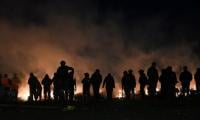Sanaullah case: Bail can’t be granted under CNSA provisions
ISLAMABAD: The provisions of Control of Narcotic Substances Act (CNSA), 1997 under which senior Pakistan Muslim League-Nawaz (PML-N) leader Rana Sanaullah has been charged by the Anti-Narcotics Force (ANF) oust bail by the trial court.
Legal experts point out that superior courts do grant bails even when the subordinate legislation, the CNSA being one such piece, bars this facility. For example, these courts have been giving bail to the accused persons arraigned under the National Accountability Ordinance (NAO) although the law expressly prohibits it. Recently, the Lahore High Court had bailed out a number of such accused.
Like the harsh NAO, the CNSA also rules out bail to be provided by courts to persons tried under its different sections. When the quantity of the narcotics recovered from the accused exceeds a certain limit and the offence is punishable with death or life imprisonment, the bail is barred.
Rana Sanaullah was charged under section 9(c) of the CNSA, which says an accused shall be punished with death or imprisonment for life or imprisonment for a term which may extend to 14 years and shall also be liable to fine which may be up to Rs1 million if the quantity of narcotic drug, psychotropic substance or controlled substance exceeds 1kg. Provided that when the quantity is more than 10kg, the punishment shall not be less than imprisonment for life.
The ANF claimed to
have recovered 15kg of contraband from the PML-N leader’s car that his close relatives deny and allege that he was trumped up.
Under the same provision, the imprisonment may extend to 2 years, or with fine, or with both, if the quantity is 100 grams or less; and 7 years if it exceeds 100 grams but is not more than 1kg.
Section 51 bars bail to accused like Rana Sanaullah and says notwithstanding anything contained in sections 496 and 497 of the Criminal procedure Code (CrPC), bail shall not be granted to a person charged with an offence under the CNSA or under any other law relating to narcotics where the offence is punishable with death. In the case of other offences punishable under the CNSA, bail shall not be normally granted unless the trial court is of the opinion that it is a fit case for its grant and against the security of a substantial amount.
Sections 496 and 497 of CrPC deal with “when bail may be taken in case of non-bailable offence” and “in what cases bail to be taken”. Section 51 of the CNSA forbid invocation of these provisions.
The ANF also invoked Section 15 of the CNSA against the PML-N leader that says whoever participates in, associates, conspires to commit, attempts to commit, aids, abets, facilitates, incites, induces or counsels the commission of an offence shall, whether such offence be or be not committed in consequence of such participation, association, conspiracy, aid, abetment, facilitation, inducement or counseling be punishable with the punishment provided for the offence or such lesser punishment as may be awarded by the court. Thus, the term of sentence of left to the court’s discretion.
Section 17 was also applied, which says whoever hinders or obstructs any officer in the performance of his functions under CNSA or willfully furnishes to such officer any information which is, to his knowledge or belief, false in material particulars shall be punishable with rigorous imprisonment for a term which may extend to three years, or with fine, or with both.
Section 9(c) is invoked against a person, who contravenes the provisions of sections 6, 7 or 8 of CNSA. These provisions relate to prohibition of possession, import or export and trafficking or financing the trafficking of narcotic drugs etc.
The ANF also mentioned Pakistan Penal Code sections 186, 189, 225 and 353 in its case against the PML-N leader. These provisions deal with obstructing public servant in discharge of functions; threat of injury to him; resistance or obstruction to lawful apprehension of another person; and assault or criminal force to deter public servant from discharge of his duty.
Rana Sanaullah locked up in the Camp Jail of Lahore is facing this kind of case for the first in life. The National Accountability Bureau (NAB) once announced that it has started an inquiry against him about the construction of an underpass in Faisalabad, but he was never summoned for questioning. Nothing was heard after this announcement made in December last.
By virtue of his senior and powerful position in the Punjab cabinet for 10 years from 2008 to 2018, he was virtually number two of Chief Minister Shahbaz Sharif. No corruption allegation has even been hurled over him pertaining to this decade when he enjoyed and exercised unprecedented powers. The PML-N’s detractors have frequently vociferously accused him of being the mastermind of the June 2014 Model Town Lahore tragedy, but he has not faced any case in this connection.
-
 'Bridgerton' Season 4: Showrunner Talks About Violet's Steamy Romance
'Bridgerton' Season 4: Showrunner Talks About Violet's Steamy Romance -
 John Tesh Recalls ‘uncomfortable’ Backlash Over ’70s Romance With Oprah Winfrey
John Tesh Recalls ‘uncomfortable’ Backlash Over ’70s Romance With Oprah Winfrey -
 Meghan Markle, Prince Harry Problem Was Not ‘work’ During Time With Royals
Meghan Markle, Prince Harry Problem Was Not ‘work’ During Time With Royals -
 Meta Strikes Multi-billion-dollar AI Chip Deal With Google: Will The New Collaboration Pay Off?
Meta Strikes Multi-billion-dollar AI Chip Deal With Google: Will The New Collaboration Pay Off? -
 Gracie Abrams Breaks Silence After Losing 2026 BRIT Award
Gracie Abrams Breaks Silence After Losing 2026 BRIT Award -
 Deon Cole Takes Swipe At Nicki Minaj In Mock Prayer During NAACP Image Awards Monologue
Deon Cole Takes Swipe At Nicki Minaj In Mock Prayer During NAACP Image Awards Monologue -
 Jennifer Garner Reveals The Actress Who 'carried Through Things'
Jennifer Garner Reveals The Actress Who 'carried Through Things' -
 Shamed Andrew ‘awful’ Time As Trade Envoy Is Laid Bare By Insider
Shamed Andrew ‘awful’ Time As Trade Envoy Is Laid Bare By Insider -
 Belgium Seizes Suspected Russian Shadow Fleet Tanker
Belgium Seizes Suspected Russian Shadow Fleet Tanker -
 Liza Minelli Makes Bombshell Claim About Late Mother Judy Garland’s Struggle With Drugs
Liza Minelli Makes Bombshell Claim About Late Mother Judy Garland’s Struggle With Drugs -
 Shipping Giant Maersk Halts Suez Canal, Bab El-Mandeb Sailings Amid Escalating Conflict
Shipping Giant Maersk Halts Suez Canal, Bab El-Mandeb Sailings Amid Escalating Conflict -
 Matthew McCoughaney Reveals One 'gift' He Achieved With Losing Nearly 50 Pounds
Matthew McCoughaney Reveals One 'gift' He Achieved With Losing Nearly 50 Pounds -
 'Scream 7' Breaks Box Office Record Of Slasher Franchise: 'We Are Grateful'
'Scream 7' Breaks Box Office Record Of Slasher Franchise: 'We Are Grateful' -
 Bolivian Military Plane Crash Death Toll Rises To 20
Bolivian Military Plane Crash Death Toll Rises To 20 -
 'Sinners' Star Blasts Major Media Company For 2026 BAFTAs Incident
'Sinners' Star Blasts Major Media Company For 2026 BAFTAs Incident -
 Inside Scooter Braun, Sydney Sweeney's Plans To Settle Down, Have A Baby
Inside Scooter Braun, Sydney Sweeney's Plans To Settle Down, Have A Baby



